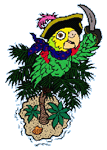 |

|
||||||||||
 |
 |
 |
 |
 |
 |
|
 |
||||
|
There's Something About Zinc by Dr. Tammy Jenkins, DVM Zinc intoxication has recently emerged as an important clinical cause of disease in birds. Zinc is an essential micronutrient and is important in many metabolic activities and for proper functioning of the immune system. However, when birds ingest zinc at high levels, zinc is a potential toxin. The metal rich environments that birds live in and bird's predisposition for chewing on these environments have put birds at risk. Galvanized wire cages may result in zinc being available for ingestion. The preferred type of galvanized wire, called Tinsley wire, is galvanized after welding and is generally considered safe. However, recent wire imports from China and Eastern Europe may not be as safe. Powder coated cages are widely available. Most are made from wrought iron or rolled steel wire and are then baked to harden the finish. Some powder formulas contain zinc. Zinc is not essential for the process but can be added to speed curing or harden the finish. It is estimated that 1 - 2% of powder coated cages contain added zinc. Zinc quick links are often used to attach toys. Galvanized dishes and cup holders may release zinc into food and water. Stainless steel nuts, screws, quick links, and dishes should be used to replace suspect products. Clinical signs of zinc intoxication are nonspecific. They may range from feather destruction to gastrointestinal discomfort or general listlessness. At high doses birds may seizure or develop fatal anemia. Zinc toxicosis can be slow and insidious. Birds frequently do not become ill immediately after exposure to a new cage or toy. Days, weeks, or months of chewing may occur before clinical signs become apparent. Diagnosis can be made through blood testing for zinc level. X-rays can be useful in the diagnosis, but most zinc-toxic birds do not show metallic foreign bodies. Cages and metal products can also be tested. Any product that contains more than 500 ppm. Zinc should be considered potentially toxic. Birds that are found to have high blood levels of zinc can be treated with chelation therapy. Results are often dramatic and rapid. Treatment should be continued for 7 to 14 days and zinc levels rechecked after therapy. Editors note: The long-term effects of zinc toxicity are a concern for all companion bird owners. We are grateful for quality avian veterinarians, such as Dr. Jenkins, who have devoted the time and resources necessary to study its effects. At Parrot Island we have always been concerned about the proper caging of birds. Safety and cleanliness are the primary reasons we use acrylic cages exclusively. We carry several lines of metal cages that are guaranteed by the manufacturer to be zinc and lead free. We also carry stainless steel and solid brass quick links for toys. Please talk to us about your birds environment we would be happy to help you determine it's safety. Additional Safety articles:
|
Copyright
© 2000-2003 Parrot Island, Inc.
Send mail to webmaster with
questions or comments about this web site.